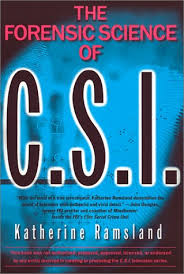Dr. Katherine Ramsland: Could You Marry A Serial Killer?
Dr. Katherine Ramsland has a master’s degree in forensic psychology from the John Jay College of Criminal Justice, a master’s degree in clinical psychology from Duquesne University, and a Ph.D. in philosophy from Rutgers. She has published thirty-three books, including The CSI Effect, Inside the Minds of Serial Killers, Inside the Minds of Healthcare Serial Killers, Inside the Minds of Mass Murderers, The Human Predator: A Historical Chronology of Serial Murder and Forensic Investigation, The Criminal Mind: A Writers’ Guide to Forensic Psychology, and The Forensic Science of CSI. With former FBI profiler Gregg McCrary, she co-authored the book on his cases, The Unknown Darkness: Profiling the Predators among Us (Morrow, 2003), and with Professor James E. Starrs, A Voice for the Dead (Putnam 2005), a collection of his cases of historical exhumations and rigorous forensic investigation.
She has been translated into ten languages; published fifteen short stories and over 900 articles on serial killers, criminology, forensic science, and criminal investigation, and was a research assistant to former FBI profiler, John Douglas (Mindhunter), which became The Cases that Haunt Us (Scribner, 2000). With FBI profiler Gregg McCrary, she wrote The Unknown Darkness, and with James E. Starrs, A Voice for the Dead, about his various historic exhumations. She currently contributes editorials on forensic issues to The Philadelphia Inquirer; writes a regular feature on historical forensics for The Forensic Examiner (based on her history of Forensic science, Beating the Devil’s Game) and teaches both forensic psychology and criminal justice at DeSales University in Pennsylvania.
Her most recent books are Into the Devil’s Den, about an undercover FBI operation inside the Aryan Nations (with Dave Hall and Tym Burkey), True Stories of CSI, The Devil’s Dozen: How Cutting Edge Forensics Took Down Twelve Notorious Serial Killers, and Murder in the Lehigh Valley. In addition, she has published biographies of both Anne Rice and Dean Koontz and penned three creative nonfiction books about penetrating the world of “vampires” (Piercing the Darkness), ghost hunters (Ghost), and the funeral industry (Cemetery Stories). From these experiences, she wrote two novels, The Heat Seekers and The Blood Hunters. Currently she’s working on a book called The Forensic Psychology of Criminal Minds.
Could You Marry a Serial Killer?
I was once on the “Montel Williams” show with Judith Ridgway, the former wife of Gary Ridgeway, who pled guilty to murdering 48 women in Washington State. We had a chance to talk alone and she was clearly dazed about how she could have been married to her “knight in shining armor” for nearly 14 years without seeing anything perverse in him. In fact, if anyone should have been a serial killer, it was her first husband, who, by her account, subjected her to abuse, rigid control, and disgusting sexual practices.
But he was not a serial killer. The man who came through the door every evening, bringing flowers or candy and attending to her needs was also the man who went out on forays to murder prostitutes. He’d once considered killing his own son. Ridgway had successfully managed two separate identities for years: one that included romantic outings and raising dogs, and one that was obsessed with punishing prostitutes and runaway girls.
When Ridgway was arrested in 2001, the police went to his home to interview Judith. She refused to believe what they were telling her. “He’s always been so gentle and caring,” she told them. “We’re best friends.” Gary had never hit or her even been angry. While he’d once been picked up on a charge of soliciting prostitutes, she thought the police had simply made a mistake – even when he’d pled guilty. He’d said it was to save them the crushing legal fees to fight the charges. Judith had moved into the home where Gary had murdered several women before she met him. She knew he’d been a suspect once in the Green River Murders, but had accepted his explanation that he merely resembled someone a witness had seen. He’d passed a polygraph, so that had cleared him. When a detective asked Judith if there was a dark side to her husband, she truthfully replied, “That I don’t know.”
Gary and Judith Ridgway
Ridgway had been such a contrast from her first husband that she couldn’t believe the charges. In fact, she was certain Gary was innocent up until the day he confessed in detail to 48 murders and said there were probably more. She recognized his dual personality when she said, “I miss the man I knew…I hate the man who took him away from me.”
Ridgway joins the ranks of serial killers who have devised strategies to pass as normal in order to enjoy a social life or have a family. In 1969, after Jerome Brudos confessed to the murders of four girls in his home workshop, surreptitiously killing even when his wife was nearby, she was charged as an accomplice. No one could believe she didn’t know, despite her insistence that she was innocent. She’d had to bear not only the horror of what her husband and the father of her two daughters had done but also the humiliation of being thought his partner in crime. She was tried and acquitted.
In 2004, when Dennis Rader was identified in Wichita as “BTK,” we once again heard a wife protest that she knew nothing about his penchant for torture and murder. The people who’d elected Rader as their church president had spotted nothing alarming as well. All of these killers knew how easy it is to manipulate others and hide their dark deeds.
Dennis Rader
Many people believe that serial killers cannot maintain careers or relationships. The public wants monsters to be obvious, and many novels and films support that naïve hope. But monsters do live among us – easily, and with little detection, because they know how to deflect suspicion. Two things about human nature assist them: how willing we are to see only what we want to see and much we generally trust that others are like us.
Ted Bundy worked a crisis hotline as he murdered young women; John Wayne Gacy (married, with kids) buried boys beneath his house while he ran a business, threw fundraisers for local politicians, and entertained sick kids; and Spokane’s prostitute killer Robert Yates Jr. was a decorated veteran with five children. “Eyeball Killer” Charles Albright was a science teacher and had a seemingly happy marriage. Child killer John Joubert assisted with a Boy Scout troop. Andrei Chikatilo had a university degree and was married, with children. Christopher Wilder was a wealthy contractor and race car driver with numerous girlfriends. Michael Ross, convicted of killing eight women, had an Ivy League degree.
Some serial killers blend in because they have the capacity to go through the motions of ordinary living while secretly acting out violently against others. They’re not obviously deranged, and can use a bland manner to hide their deviance. They need only study the people around them to figure out how to “pass.” Since most people pay scant attention to the world around them, it’s not that difficult. Now add in a committed relationship, and the common (and understandable) human tendency to turn a blind eye to avoid the relationship’s collapse, and you have the formula for how someone can date, marry, stay married to, and have children with an active serial killer.
Such predators may attend church (although without struggles of conscience) and even be considered good neighbors. They look for opportunities – taking a security job that positions them to meet potential victims, for example – and they have no qualms about exploiting it. We want to spot them, but they spot us first, and predators always have the preparatory advantage.
As killers get away with murder, they learn the best ways to deflect others from discovering their secrets. They devise different sets of values for different life frames, so that they can speak convincingly about socially-approved venues of right and wrong, yet have no qualms about their “other” behavior. (John Wayne Gacy, convicted of thirty-three murders, described himself in an interview as a crucified Christ and blamed the erosion of religious values for society’s problems.) Their secret lives grow darker and more perverse, because the morality that justifies them is entirely of the killers’ making, separate from the social morality in which they were raised and by which they get along with others. They can also carry on a high level of functioning while they troll for another victim.
Lionel Dahmer, Jeffrey Dahmer’s father, wrote “A Father’s Story” after watching his son’s 1992 trial for the murder of seventeen men. He realized that the manner in which he’d interpreted Jeffrey’s behavior had been influenced by his personal fears. He recalled questioning the reason for the freezer Jeff had purchased and accepting Jeff’s argument that it helped him to save him money. It was actually purchased to store human parts, but why would anyone suspect this?
Jeffrey Dahmer
While Lionel admitted he was unaware of his son’s substance abuse problem, he did notice that Jeffrey often seemed vacant-“enclosed”-as if thinking about nothing. Jeff had filled the bottles in the liquor cabinet with water after emptying them, but Lionel did not recognize this signal of a deep-seated problem; Jeff had a full-size male mannequin in his closet and Lionel accepted it as a “prank.” Lionel wondered why he hadn’t noticed that Jeff had such an obsession with dead animals, but even worse were the revelations about what Jeff had done while living with Lionel’s mother.
She’d complained about a terrible odor. When confronted, Jeff told his father he liked to experiment with chemicals on chicken parts from a grocery store. Lionel discovered smelly liquid near the garbage cans, but he thought it was ordinary meat juice. “…I allowed myself to believe Jeff,” Lionel mused, “to accept all his answers regardless of how implausible they might seem….More than anything, I allowed myself to believe that there was a line in Jeff, a line he wouldn’t cross….”
Lionel and Shari Dahmer
Lionel’s denials are understandable. Parents, spouses, and other close associates often do seek the best possible interpretation of something a loved one has done. That’s how those same loved ones get away with having affairs or stealing from Mom’s purse. That’s often why children are not taken to counselors for behavior that needs intervention; the parents hope the kids will “grow out of it” on their own. In fact, on the day that Lionel Dahmer realized from an arrest that his son was a liar, exhibitionist, thief, and child molester, he thought to himself, “even all those grotesque and repulsive behaviors could be thought of as a stage through which he would one day pass.” He compared his practice of denial to creating a soundproof booth over which he had drawn curtains. Something similar can probably be said about many other people in close contact with serial killers.
But we must credit the killers as well with the ability to hide their secrets and perfect their acting skills. Even from prison, Gary Ridgway continued to write love letters to Judith as if what he’d done should not come between them. This killer of more than four dozen women told her to think of him whenever she heard the love song from “Titanic.”
* * *
Please visit Dr. Ramsland’s website to learn more about her and her work.
* Books by Katherine Ramsland














Yes, I think I know who you mean, and he came across as a choir boy. Still does, despite the evidence. But we see what we want to see.
We met with with the h.s. girlfriend of Centerline Michigan’s serial fellow, who killed on Washtenaw County’s campuses. The star athelete was raised in a Church centered community of bungalow homes. His repressed anger began to fester into spookier manifestations only after he left for college.
Charm and good manners gave way to blatent attempts at manipulation and domination while there. Even as his college social life began to unravel, a few of those with whom the psychopath had but shallow social interaction with still strongly believed in him. They were smitten. One sorority girl devoted herself for years as his groupie upon his conviction. Any hometown supporters who expressed the least bit of doubt in his innocence say that they were cut from his visitor list, and cards from him ceased.
I’m afraid I can’t do it in such a brief venue. I’ve written a lot about prison groupies, as well as serial killer groupies. Some are male, most are female. Many are accomplished, even married. Almost all have strange ideas that fail to fit the facts. Maybe I’ll devote a blog to it. It’s too complex to go into here. But thanks for asking. You gave me a blog idea. But I’m glad to know he’s single again. I was thinking that maybe I’d cozy up to him and get a book out of it.
An update: according to the Chicago Tribune this morning, the new girlfriend moved out of his home yesterday. But that whole story, along with those of people who fall in love with incarcerated convicted murderers, is interesting. In a case in Kansas not long ago, a married woman running the “inmates and dogs” program at the state prison was convicted of helping her convicted murderer boyfriend escape. Would you comment on the psychopathology of someone who is attracted to, and taken in by, these dangerous individuals?
It certainly is. But these guys (and gals) count on the “naive dupes” who fall for them and defend them. Some are just normal people who aren’t looking for trouble, but the groupie mentality is another thing altogether. More than one of these woman has been murdered.
Thank you for your spot-on insight.
Unfortunately, we in the Chicago area watching the very public start to a relationship similar to what you have discussed. You may have seen the Nightline piece about it. A former police sergeant suspected of, but not charged with, the murders of two ex-wives has asked his new girlfriend to marry him. He claims she doesn’t believe a word that’s been written about him in the media. In response to criticism from her family, he was quoted as saying something to the effect of “I’d be wary of a guy like me, too.”
Frightening, eh?
Actually, an IQ score is no indication of cleverness, and Ridgway was certainly both clever and canny. He beat a polygraph as well as figured out how to defy an impressive task force, even when he was a suspect. But to hold Judith responsible for her ignorance is unfair. That’s how well compartmentalization works.
You were married to the man for fourteen years. At some point in that relationship you must have suspected Gary was hiding something from you?
Gary had an IQ of 82. Was that ever a factor in your relationship? Do you think the low IQ helped cloak his deception?
This post makes me glad I’m not dating:-)
Reminds me of the comment always made when a neighbor turns out to be a bad guy. “But he was always so nice.”
Are these nutjobs so good at lying that Doctors do not try to see how they are wired ?
How awful for the family that has to go through that.
Yes, it makes us feel safer. And sometimes there IS an outward sign, but we tend to interpret it in some other way.
Fascinating! It’s so true we like our monsters to have at least some outwardly visible sign that they are what they are.